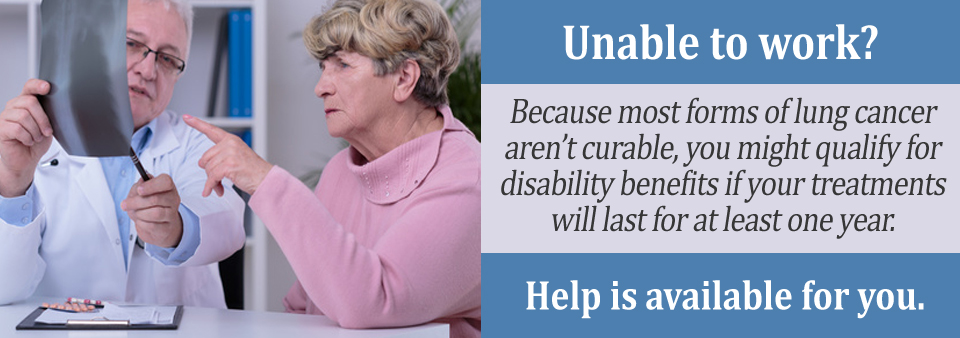Lung cancer is the most common cancer worldwide. It is also the deadliest, accounting for 27% of all cancer deaths. More than half of the people diagnosed with lung cancer die within one year the diagnosis.
If you have lung cancer, your symptoms and required treatments may be interfering with your ability to work. If so, there is a good chance that you might qualify for disability assistance through the Social Security Administration.The Social Security Administration oversees programs to assist those who have become disabled due to a devastating illness, such as lung cancer. Lung cancer is considered a disability by the SSA.
What Exactly Is Lung Cancer?
Lung cancer is cancer that begins in the lungs. Those who smoke or who have been exposed to smoking are at the highest risk of developing lung cancer.
There are two major types of lung cancer. The most common type of lung cancer is non-small cell lung cancer (NSCLC), which make up approximately 85% of lung cancer cases. The remaining 15% are small cell lung cancers. While small cell lung cancer tends to grow more quickly, it is also more responsive to treatment.

The long-term prognosis of lung cancer depends on when the cancer was discovered. If found early, some treatments such as surgery may be helpful. However, lung cancer is often found in the later stages. In those cases, it is much for difficult to treat. Only 10% of lung cancers can be cured.
How Can I Expect My Life to Change?
Lung cancer looks different for everyone. Below are some possible symptoms that you might experience if you have lung cancer, as well as some possible treatment side-effects.
- The first signs of lung cancer may include a cough that won’t go away, shortness of breath or wheezing, chest pain, difficulty swallowing, coughing up blood, extreme tiredness, and weight loss. Since many of these symptoms are consistent with a common cold or another virus, many people initially ignore them.
- Lung surgery is common for patients with early stage lung cancer. If you have surgery, you will need to be out of work for a significant length of time to recover. You may experience pain and shortness of breath that will likely require respiratory therapy and pain medication.
- Most patients with lung cancer require radiation therapy or Chemotherapy, or a combination of both. These treatments often come with several side effects, depending on the dose or length of the treatment. While some people can continue working while receiving treatment, most people cannot.
Do I Qualify for Benefits?
As your lung cancer will likely be expected to last for more than one year and as your illness will likely impact your ability to work, there is a good chance that you will be able to qualify for disability benefits through the Social Security Administration.
If you have been diagnosed with a non-small cell lung cancer that was unable to be removed by surgery or that has spread to other areas of the body, you will qualify for Social Security benefits. You will also be eligible for benefits if you have a small cell lung cancer or lung cancer in the superior sulcus at the top of the lungs. In fact, these diagnoses will qualify you for a "Compassionate Allowance,” which will speed up your application process.
Even if you do not have one of the above diagnoses, but you have symptoms that make it difficult for you to work, the Social Security Administration may approve your application. For example, if you are short of breath and it impacts your ability to work, you may be eligible for benefits.
If your lung cancer is so severe that you are expected to die, your case will be flagged by Social Security for fast handling.
What Information Will I Need to Provide?
When applying for Social Security for your lung cancer, you may be asked to provide the following:
- Confirmation of your diagnosis of cancer from your Oncologist, including biopsy results or a pathology report.
- Physician notes discussing your symptoms, treatments, limitations, and long-term prognosis. The records should also include how you are responding to your treatments.
- Surgical reports including findings and the examination of any tissue examined as a result of the surgery.
- Images such as X-rays, MRIs, or CAT scans showing the location of your tumor or spread of the disease.
- Records from other physicians or health care providers that may be involved in your care. For example, those with lung cancer often work with a Respiratory Therapist.
I'm Ready to Apply. What’s Next?
If you have been diagnosed with lung cancer, you should contact a disability advocate or lawyer in your area immediately. A qualified attorney can help you navigate the Social Security application process, thus giving you the time to take care of your health.